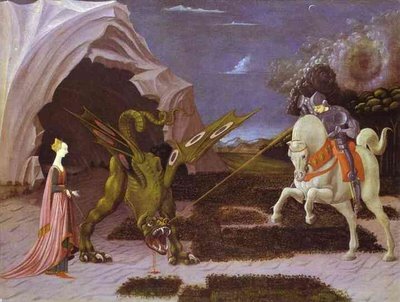Generic Blog Post
I'm gonna try and cover all the bases with this. I am going to try and cover all the bases with this post. I'm going to try to hit the targets that I see, and bring into focus the ones that are blurry right now. There's an article about a Picasso painting of Dora that is the second highest bid of all time. It's a pretty painting. Last night I read an Ann Beattie story called Taking Ucello home. I didn't know which renaissance painter Ucello was. Made me depressed, after spending a month in Italy, he didn't ring a bell. But I was glad to see that, after a little bit of research, I've seen his work before. He did a famous St George and the Dragon that I have known for a long time.

Art people make me feel stupid. Mainly because I know so much about music, and really, so little about the visual arts. Except for the fact that I've been to a lot of art museums. And love art. Maybe I should write about art because of that fact. But they shouldn't make me feel stupid. Art is as much a game of the gut as a game of the head. Sometimes somebody who isn't really into abstract painting will ask me how they are supposed to enjoy a blank or splotchy canvas. You look at it and you see if it makes you feel something. Same as when you are sitting and listening to music. Or with a piece of literature. Sometimes you'll get hit by it immediately. Sometimes it will hit you days later. I think it is not so important IF it affects you, or how INTENSELY; rather, it is the quality of the effect. I think it is like wine. Any wine will affect you. But some has a natural sweetness or bitterness that transcend the ordinary. I really like the idea of natural sweetness. Even crude oil comes in a prized "sweet" variety. (An Iraqi or Venezuelan vintage, say.) But, really, good coffee or good wine has a natural sweetness that is not the same as having a cane-sugar taste. But this sweetness is just one facet of art. There's also "depth." I am tiptoeing around the idea of "heart," and "soul," because I have always hated these terms. I prefer depth.
(Last night I listened to a lot of music. I mean, I just sat and listened to a billion mp3s. Not a billion, but more than a thousand. I was looking for music that would go well with imagery. It makes you hear music differently. It's weird how a piece of music will sound different to you if you associate it with a images, moving or otherwise.)
I said one day I'd write a post about reality. Well, no time is better than the present. Is life a dream or a reality? Is there no distinction between dream and realitiy? I would say that, morally, we must distinguish between dream and reality. It is very easy to abstract oneself away from reality, labeling perception as subjective and therefore one's experience as a dream; but this does an injustice to all that we hold dear. What do I mean? I mean that there is, undeniably, a REALity. And the phenomenon of dreams and unreliable senses are inextricably a part of this reality. But calling reality a dream is sloppy and dangerous. Especially when you are in a privelaged educational and cultural status. Free citizens of the most powerful country in the planet do not have the luxury of labeling their existance as dream-like. The paper I print things on come from real trees, the computer I type on comes from a real factory in China, the factory emits real toxins, and workers who die on the job in the factory get taken by a real German scientist and get injected with real plastic and are displayed in real museums in the US. This is not very Buddhist of me. But I think that it is this view of life as a dream that leads to atrocity.
If you don't buy that, well, I have another angle. Real life is absolutely mundane compared to dreamlife. Dreams are amazing. They are scary. They hold potential, they are idea generators, they are mysterious, and maybe the only genuine organic mystical experience. Calling life a dream does a disservice to dreams. Life really is nothing like dreams. Sometimes we have lifelike dreams, but dreams are rarely like life. Merrily merrily, dream is but a life. And let its life be discrete from reality.
Where to now? Well, let's inorganically step back to politics. I mentioned in an earlier post that I was reading this book called The New Rulers of the World, by an Australian auther John Pilger. I thought I'd quote the most astounding passage from this great book:
Like Wally MacArthur, Eddie Gilbert is another forgotten name. In the 1930s, Eddie, a fast bowler, was given special permission to play outside the Queensland reserve, in a white team. He took five wickets for sixty-five runs against the West Indies. In 1931, he faced Donald Bradman, the world's greatest batsman, and bowled him for a duck. (P. 190)
AMAZING, huh?! Five wickets for sixty-five runs? Seriously, it was the only incoherant passage in the whole book. I suppose if Pilger was talking about any sport, I'd have no idea what he was talking about, considering my willful ignorance on the subject. Super-seriously, though, Pilger is talking about the extreme marginalization of Aborigines in Australia. The Aborigines have faced prejudice and exclusion to a degree even more extreme than native Americans and Blacks in the US. It is very disturbing.
This leads to the idea of Genocide. There was a PBS show last week about the genocide of Armenians by the Turks. And basically how the Turkish government completely denies everything and anything connected to it. And it seems that the Turkish government wants to distance itself as much from the G-word, than wholesale slaughter of innocent people. I guess because killing isn't necessarily political, just day-to-day business; but if its genocidally motivated, all the sudden the Turks are Evil. I guess because the recognition of the evilness of killing is unavoidable, and, apparently, the act of killing is unavoidable, we have to call certain kinds of killing more evil than others; therefore a relative evil dynamic is established and it follows logically that the more evil parts should therefore be truncated from the body of mankind lest the disease spread. That seems to be the general humanitarian argument about starting wars and executing criminals. I always thought that Return of the Jedi was a great movie, if flawed, for the great drama between the Emperor and Luke at the end: Should Luke use the darkside to kill his evil father? DID Luke use the darkside to kill his father? Or is their understanding of the force limited by their moral paradigm? Perhaps it is much more complex.
I covered some of the ground I wanted to. I feel better even though the world still sucks.
No comments:
Post a Comment